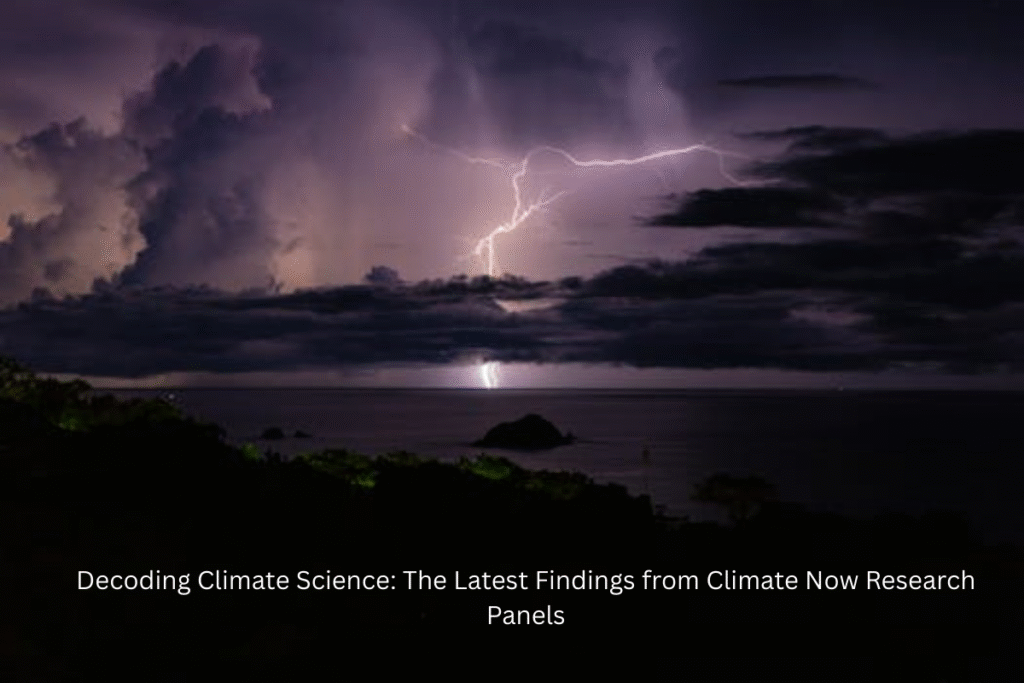
Climate science is continuously evolving, with new data and groundbreaking research providing a clearer picture of the challenges we face and the actions we must take to combat climate change. At Climate Now, experts come together in research panels to discuss and share the latest scientific findings that are shaping the future of climate action.
In this article, we explore the most recent findings presented at Climate Now Research Panels, offering insights into global warming, carbon emissions, climate resilience, and the innovative strategies that are being developed to address the climate crisis. Understanding these findings is crucial for policymakers, businesses, and individuals who are committed to taking meaningful action against climate change.
Key Findings from Recent Climate Now Research Panels
At Climate Now Research Panels, scientists and climate experts present findings that have the potential to drive global climate policies and sustainability initiatives. Here are some of the most significant insights from the latest panels:
1. The Accelerating Rate of Global Warming
Recent research presented at Climate Now Panels has shown that global temperatures are rising faster than anticipated. The latest data reveals that the Earth is on track to exceed the 1.5°C temperature increase limit set by the Paris Agreement unless immediate action is taken. Key takeaways include:
- Global Warming Trends: The Earth has already warmed by approximately 1.2°C since pre-industrial times, with projections indicating that we could reach 1.5°C in the next decade.
- Melting Ice Caps and Rising Sea Levels: The loss of polar ice is contributing to rising sea levels, which threaten coastal communities and ecosystems.
- Extreme Weather Events: Increased global temperatures are linked to more frequent and intense heatwaves, droughts, and flooding.
2. Carbon Emissions: A Critical Challenge
One of the main contributors to global warming is the increase in carbon emissions. Research from Climate Now Panels highlights the urgent need to reduce carbon emissions across all sectors:
- Fossil Fuels: Despite progress in renewable energy, fossil fuel consumption remains the largest source of carbon emissions.
- Carbon Capture Technologies: Emerging technologies like direct air capture (DAC) and carbon capture and storage (CCS) are being explored as potential solutions to reduce excess CO2 in the atmosphere.
- Sectoral Emissions: Industries such as transportation, manufacturing, and agriculture remain significant contributors to carbon emissions.
3. The Importance of Climate Adaptation Strategies
While mitigating climate change is essential, adapting to its effects is just as critical. Climate Now Research Panels emphasize the need for adaptation strategies that will help communities and ecosystems cope with the inevitable impacts of climate change:
- Urban Resilience: Cities are developing green infrastructure and climate-resilient designs to reduce the impact of extreme weather events.
- Water Management: Innovations in water-saving technologies and climate-adaptive irrigation are crucial to managing water scarcity in areas affected by droughts.
- Biodiversity Protection: Efforts to protect and restore ecosystems, such as forests and wetlands, are critical for maintaining biodiversity and supporting climate adaptation.
4. Innovations in Renewable Energy Technologies
Renewable energy continues to be at the forefront of the transition to a low-carbon economy. The Climate Now Panels have highlighted several innovations that are accelerating the adoption of clean energy:
- Solar and Wind Energy: Technological advancements in solar power and wind energy are making these sources more efficient and cost-competitive.
- Energy Storage: Breakthroughs in battery storage technology are helping to solve the intermittency problem of renewable energy, allowing for more reliable and consistent power generation.
- Green Hydrogen: Research on green hydrogen has shown that it has the potential to decarbonize hard-to-abate sectors, such as heavy industry and long-distance transport.
5. The Role of Climate Policies and Global Cooperation
The research panels also stress the importance of strong climate policies and international cooperation to effectively address climate change:
- International Climate Agreements: The Paris Agreement remains the most significant global effort, but it needs to be strengthened with more ambitious targets and commitments from all countries.
- National Climate Policies: Governments must implement carbon pricing, green investment programs, and strict emissions regulations to reduce national carbon footprints.
- Private Sector Engagement: Corporations play a critical role in reducing emissions and promoting sustainability through corporate responsibility and green innovation.
FAQs About Climate Science Findings from Climate Now Research Panels
1. What are the main contributors to global warming?
The primary contributors to global warming are carbon emissions from the burning of fossil fuels, such as coal, oil, and natural gas. Other factors include deforestation, industrial processes, and agricultural practices.
2. How urgent is the need for action on climate change?
Recent research shows that climate change is happening faster than expected. Immediate action is crucial to limit global warming to 1.5°C and avoid catastrophic impacts such as rising sea levels, extreme weather events, and ecosystem loss.
3. What role do renewable energy technologies play in combating climate change?
Renewable energy sources like solar, wind, and hydropower are essential in reducing carbon emissions. Technological innovations in these sectors, such as advanced solar panels and offshore wind farms, are making renewable energy more efficient and accessible.
4. What is carbon capture technology, and how can it help reduce emissions?
Carbon capture technologies, like direct air capture (DAC), capture excess carbon dioxide from the atmosphere or from industrial emissions. These technologies can help offset emissions from sectors that are difficult to decarbonize, such as heavy industry and transportation.
5. Why is climate adaptation important?
While reducing carbon emissions is essential, adapting to the inevitable effects of climate change—such as rising sea levels, extreme weather, and drought—is equally important. Adaptation strategies help communities protect infrastructure, resources, and ecosystems from the impacts of climate change.
Conclusion
The latest findings from Climate Now Research Panels provide valuable insights into the science of climate change and the urgent need for comprehensive action. From reducing carbon emissions and advancing renewable energy technologies to building climate resilience in communities, these findings underscore the importance of global cooperation and innovative solutions. As we continue to tackle the climate crisis, it is clear that science, technology, and policy must work hand in hand to create a sustainable future for all.
